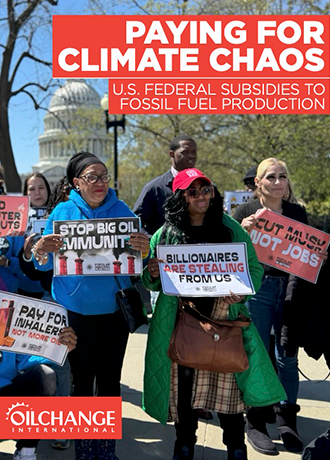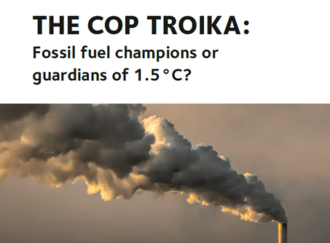
Paying for Climate Chaos: U.S. Federal Subsidies for Fossil Fuel Production
"Paying for Climate Chaos" reveals the staggering scope of federal government subsidies for fossil fuel production.
Oil Change International publishes upwards of 20 reports and briefings every year focused on supporting the movement for a just phase-out of fossil fuels.

"Paying for Climate Chaos" reveals the staggering scope of federal government subsidies for fossil fuel production.

New report explores the attitudes of Norwegian voters on oil and gas issues before the upcoming September election. The survey reveals that Labour Party voters place a higher priority on reducing Norway’s climate emissions and transitioning away from oil and gas towards renewable energy, compared to the national average.

Big oil and gas companies’ voluntary “Decarbonization Charter,” launched at COP28, is a dangerous distraction from the urgent need to rapidly phase out fossil fuels. New data shows Charter members have approved massive oil and gas expansion plans since signing on.

New research shows COP Troika nations - Brazil, UAE, and Azerbaijan - plan to expand oil and gas production 32% by 2035, endangering the 1.5°C climate limit their role as COP presidencies is meant to champion. Limiting warming to 1.5°C, a key objective the COP Troika has committed to defend, requires countries to immediately end fossil fuel expansion.

This updated analysis highlights the ongoing complicity of multiple countries and companies in fueling Israel's war machine. As more and more Palestinians are killed in bombings and pressure intensifies on global leaders, including US presidential candidates, to end the genocide, these suppliers continue to enable the violence.

Oil Change International commissioned Data Desk to provide an overview of the supply chains that are currently bringing crude oil and refined products to Israel, focusing on fuel supplies to the country's armed forces.

A new report analyzes how the Inflation Reduction Act fails to reduce fossil fuel production or alleviate impact on environmental justice communities, and that current policies will instead lead to a deadly increase in oil and gas production and exports.

A new report commissioned by Oil Change International attempts to map out the potential influence that oil and gas interests may have on other influential stakeholders in Norway.

This new analysis, an update to the data in our landmark Sky's Limit series, finds that the majority of the fossil fuel reserves within active fields and mines must now stay in the ground. Using updated 2023 data, the proportion of coal, oil, and gas reserves that must remain unextracted to meet the 1.5°C limit has increased from nearly 40% in 2018 to almost 60% in 2023.

The briefing reveals that new oil and gas production approved to date in 2022 and at risk of approval over the next three years could cumulatively lock in 70 billion tonnes (Gt) of new carbon pollution. This is equivalent to almost two years’ worth of global carbon emissions from energy at current levels, 17 percent of the world’s remaining 1.5°C carbon budget, or the lifecycle emissions of 468 coal power plants.